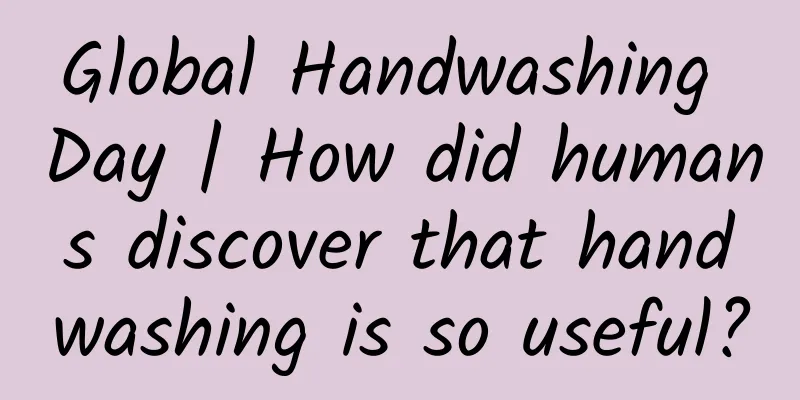Global Handwashing Day | How did humans discover that handwashing is so useful?

|
According to the United Nations, more than 500,000 children die from diarrheal diseases every year, which means that every minute, a little life dies from bacterial infection. Most of these deaths can be prevented by simply washing hands. Washing hands, this seemingly ordinary action is closely related to our life and health. Today is World Handwashing Day. We no longer simply talk about the importance of handwashing, because it has long been deeply rooted in people's minds. So how did humans discover that handwashing is so useful? This has to start with the discovery of bacterial infection. In 1676, Dutch scientist Antonie van Leeuwenhoek observed bacteria for the first time using a microscope, but people at that time knew nothing about these tiny organisms. At the same time, infectious diseases were rampant around the world. These diseases are what we call "bacterial infections" or "viral infections" today. Until the 19th century, the medical community still could not explain many mysterious high fevers and organ failures. At that time, maternal mortality was particularly high, and many women died of sudden high fevers after giving birth. Hungarian obstetrician and gynecologist Semmelweis was determined to solve this mystery. Through the analysis of many cases and autopsies, he finally came to a painful conclusion: the source of infection came from the hands of doctors. It was these hands that passed "invisible pathogenic particles" to patients through wounds, causing fatal infections. Semmelweis wanted to promote the use of disinfectant in hospitals, but his colleagues were skeptical of this idea. The hand-washing rule was not successfully implemented, and pregnant women and patients continued to struggle in dire straits. The doctor gradually became insane because he was not recognized and died at a young age. For modern people, it is hard to imagine that doctors do not wash their hands or clean the wounds of patients, but less than 200 years ago, all these tragedies really happened. Many of the knowledge and habits that we take for granted today are based on endless blood and tears. Today, people have been educated on the importance of hand washing since childhood, which has made hand washing a "built-in program" in the modern brain that will not be easily forgotten. But the reality is that the impact of not washing our hands, and not washing them properly, is often underestimated. Before we realize that our hands are dirty, invisible bacteria have already quietly "set up camp" on our skin. Many of our seemingly clean surfaces can be observed under a microscope, and we can find that these germs are not only everywhere, but can also spread at an alarming rate. A study It shows that in an office environment, bacteria from high-frequency contact points such as door handles can spread to 50%-60% of employees and other objects in the workplace in just a few hours. These bacteria can cover multiple surfaces in a short period of time, increasing the risk of infection. For example, bacteria carried on the hands can cause a variety of diseases such as hand, foot and mouth disease and gastrointestinal infections. Especially in areas where sanitary facilities are scarce and hand washing is not possible in a timely and convenient manner, germs on hands are hard to guard against. According to statistics, 40% of the world's population still cannot obtain basic hand washing conditions at home, which exposes them to the threat of germs every day. For children in poor areas, washing hands is even more of a luxury, and they are therefore more susceptible to diseases and fall into a vicious cycle of health and poverty. In my country, hand washing facilities are well-equipped in both public places and residents' homes. However, not many people really wash their hands "correctly" and know how to wash their hands. It is very likely that you have been "washing your hands wrongly" for many years. The report shows that only 4% of Chinese people wash their hands correctly. Many people think that just washing hands with a little water and rubbing with soap is enough, but in fact this "sloppy" way of washing hands is not effective. To achieve true "cleanliness", the hand washing step cannot be omitted at all. First of all, you have to choose the right time to wash your hands. Before eating, after going to the toilet, after going out and coming home, and after contact with patients are all "must-wash times". Secondly, running water is the key to washing hands. Still water may be full of germs, and only running water can completely wash away these "invisible enemies". Furthermore, soap and hand sanitizer are the nemesis of germs. They can effectively remove the grease and dirt on your hands, leaving germs nowhere to hide. Finally, wash your hands for a sufficient amount of time. At least 20 seconds to ensure that the germs are completely removed. In general, hand washing is not only a personal hygiene habit, but also a global hygiene project. It is one of the symbols of the progress of human civilization. The establishment of World Handwashing Day is to remind people: Don't let the seemingly insignificant "little thing" of handwashing become a big health problem. To fight the "health protection war", we must start with washing our hands carefully every time. As long as you wash your hands for 20 seconds each time, you can wash your hands cleaner and bring health closer to us. Are you willing? This article is a work supported by the Science Popularization China Creation Cultivation Program Author: Dongdongmiao Popular Science Reviewer: Tao Ning, Associate Researcher, Institute of Biophysics, Chinese Academy of Sciences Produced by: China Association for Science and Technology Department of Science Popularization Producer: China Science and Technology Press Co., Ltd., Beijing Zhongke Xinghe Culture Media Co., Ltd. |
<<: Watch out! These eye habits are "stealing" your eyesight. How many of them do you have?
>>: Unveiling the miracle of early sleep! Solve more than 80% of the body's problems
Recommend
How to care for postpartum lacerations?
Many women will have torn wounds in their private...
What medicine is used for female anal pain
The anus is an extremely private part of our body...
How long after giving birth can I start running to lose weight?
You can do simple exercises 2 weeks after giving ...
Treating hypertension in the elderly with a two-pronged approach of "taking medicine and nursing"
...
Uterine pain after miscarriage
Uterine pain after miscarriage is a symptom of po...
High-grade serous ovarian cancer
The incidence of ovarian cancer has been very hig...
The harm of not having menstruation for four months
Menstrual irregularities are a common problem amo...
What causes postpartum coughing and urine leakage?
I believe every woman is very happy psychological...
Which pregnant women are prone to heavy bleeding
Postpartum hemorrhage is a common disease during ...
Girls have stomach pain
If a girl experiences lower abdominal pain during...
What causes right lower abdominal pain and bleeding during ovulation?
Ovulation is a normal physiological phenomenon fo...
Is it OK to eat hot pot when pregnant?
Eating hot pot is almost the most important eatin...
How to treat postpartum bleeding?
Mothers need to take supplements before and after...
Eating cake = being poisoned? Does it really take 51 days to metabolize a mouthful of trans fatty acids?
Many people are familiar with "trans fatty a...
How many lines on the pregnancy test stick indicate pregnancy?
As soon as everyone hears the word "pregnanc...









